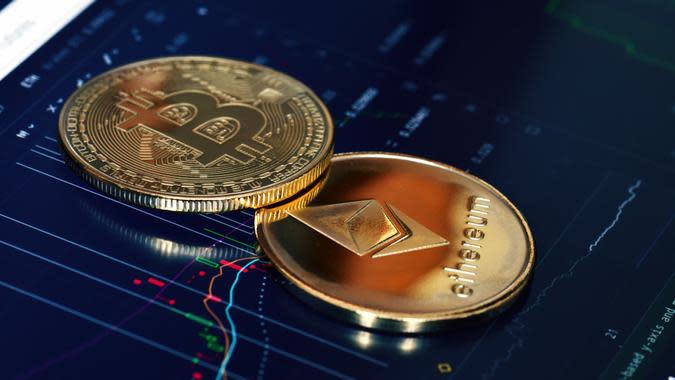10 Investing Mistakes To Avoid for 2022

The start of a new year always brings a slate of challenges for investors. While the January to May period is often favorable, there's no telling when the next correction will come, and investors have to weigh whether the trends of the prior year will continue or evaporate in a market rotation.
Important: Portfolio Updates You Should Make This Year
See: 10 Cheap Cryptocurrencies To Buy
Heading into 2022, investors face a huge set of unknowns, from inflationary concerns to rising interest rates to what some would call an overvalued stock market. In this market environment, there are plenty of mistakes that investors should seek to avoid. Here are just 10 of them.

Overreacting to a Market Selloff
If you're an investor in the stock market, you should know that corrections, or selloffs of at least 10%, are inevitable. In fact, since 1928, stock market corrections have occurred every 19 months, on average. As of January 2022, it has been nearly two years since the market suffered a 10% or greater setback, the last being the pandemic-related plunge of 34% in March 2020. Since then, the market has gone more or less straight up, prompting many analysts to warn of an impending correction. But even if that correction comes, you shouldn't panic. The reason many investors underperform the market is that they sell out when the market is down and things seem bleakest. Those who ride out corrections, on the other hand, have always seen the market race on to new highs.
Options: 13 Ways To Invest That Don't Involve the Stock Market

Putting All Your Money Into Crypto
Even if you're a conservative investor, there's just no way of avoiding all the chatter about cryptocurrency these days. Reports of unfathomable gains in the crypto sector dominate the financial news, with whimsically named tokens like Shiba Inu posting returns of 43 million percent in 2021 alone. Hearing of these types of returns, investors looking for a quick buck are understandably drawn to cryptocurrency. While there's nothing wrong with investing the speculative portion of your portfolio in crypto, putting your whole nest egg there -- or into any single investment, for that matter -- is courting ridiculously high levels of risk. When billionaire fund managers like John Paulson state that cryptocurrencies will eventually go to zero, you should think twice about putting too much of your money into that type of asset class.
Also Read: Ways Investing Will Change in the Next 25 Years

Trading at a High-Cost Broker
In 2022, there's no need whatsoever to conduct your trading at a high-cost broker. While paying up for specialized financial services like estate planning or wealth preservation may be worth it for some individuals, there's absolutely no reason to pay for your stock and ETF trades. In addition to the countless online brokers like Robinhood and SoFi that allow you to trade stocks for free, many old-time, well-known brokers, from Schwab and Fidelity to Merrill Lynch and Chase Bank all now offer $0 commission trading as well. In this type of environment, paying to execute your day-to-day investment transactions will needlessly drag down your investment returns.
Explore: The Most Fascinating Things You Never Knew You Could Invest In

Failing To Rebalance
The start of the year is a traditional time for investors to rebalance their portfolios. However, it's not the timing of the rebalance that is as important as it actually happening. Although stocks with momentum often continue trading higher, no security goes straight to the moon without ever going down. By trimming your overweighted positions and reallocating that money to lower-performing investments in your portfolio that you still believe have potential, you can "sell high and buy low," which is a winning formula for long-term investing.
Keep Reading: Cryptocurrency Predictions for 2022

Avoiding Real Estate
Real estate had an absolutely amazing 2021, with many regions up over 20% for the year. While this type of standout performance in a typically unexciting asset class might scare some investors away, the reasons for the success of real estate in 2021 remain intact as we head into 2022. Although mortgage interest rates have ticked a bit higher in January 2022, they still remain historically low, making it a great time to lock in a long-term rate. The American economy is still growing rapidly, in spite of inflationary pressures, supply chain issues and labor shortages, and there's still stimulus money floating around in the pockets of individuals and businesses that will likely be deployed at some point. All of these factors should support higher real estate prices in 2022.
Learn: 20 Investments That Are Recession-Proof

Chasing Performance
Chasing performance has always been a dangerous investment "strategy," but heading into 2022, it can be even riskier than usual. In 2021, cryptocurrency and meme stocks were the most prominent highflyers, with returns from as "modest" as AMC Entertainment's 1,183% gain to Shiba Inu's incredible 43 million percent return. Piling into speculative "winners" like that nearly always ends up in disaster for the average investor. First, you have to assume others will continue to buy and push the price up even higher, but what's even more difficult is deciding when to sell. Investments with skyrocketing performance can easily turn on a dime and drop 50% or more, and the question at that point is, add more or sell? It can be hard to know. If you feel the need to take a flyer on these types of investments, just keep them at a small percentage of your overall portfolio.
More: 16 Money Rules That Millionaires Swear By

Putting All Your Eggs in One Basket
Failure to diversify is one of the cardinal sins of successful long-term investing. Although you may be able to pump up your returns over the short term by picking a hot stock, the risk to your long-term portfolio is too great. Should you pick the wrong stock, you might end up with a loss of 50% or more, which would then require a gain of over 100% just to break even. Even if you pick a big winner, it can be hard to know when to get out. You may temporarily double or even triple your money, only to see those losses evaporate as you wait and wait and wait for the stock to make another new high.
Costly Errors: 10 Most Expensive Investing Mistakes, According To Experts

Investing Without a Written Strategy
It's easy to think that investing is like a casino, but in reality, the long-term returns of the stock market are pretty reliable. In fact, there has been no 20-year rolling period in the history of the stock market where the S&P 500 returned a loss, and the long-term average return of the S&P 500 has been 10.5% annually. That's enough to double your money in less than seven years. To snag those types of reliable returns, however, you'll need to develop and follow an investment strategy. Having a written investment strategy can prevent you from investing based on your emotions. The way human nature works, everyone wants to be in the market when it's making new highs, but no one wants to buy it if it's dropping to new lows. If you stick to your written investment strategy, you can avoid making ill-timed investment decisions and instead stick to the path of long-term financial success.
Research: How To Find the Best Financial Advisor for You

Overtrading
While the advent of $0 commissions to trade stocks and ETFs has no doubt been an overall benefit to investors, it's not without its drawbacks. For some investors, not having to pay anything to buy or sell a stock can lead to overtrading. Buying and selling securities frequently not only carries the risk of tax consequences, but it also tends to damage long-term returns. The bottom line is that most investors aren't great at being stock traders, and the more often you trade, the more likely you'll be on the short end of the stick. According to a paper co-authored by Brad Barber, a professor at the University of California, Davis, "We link periods of intense buying by retail investors at the brokerage Robinhood to future negative returns." While Robinhood alone isn't the only source of overtrading, as one of the pioneers of the $0 commission movement, it is where many active traders reside, and their frequent trading often leads to underperformance.
Get Started: The Best Trading Apps for New Investors

Becoming Emotional About Stock
"Never get emotional about stock. It clouds the judgment." Most stock investors are familiar with this quote from the fictional character Gordon Gekko in the movie "Wall Street." And while the movie may take liberties with how the stock market actually operated in the 1980s, this quote still remains a Wall Street truism. Fear and greed are the two primary emotions in stock trading, and too much of either can lead to disastrous results. Fear of losing more money shakes many investors out of their positions right before they bounce back, while greed for more profits -- along with its sister, fear of missing out -- makes other investors chase high-flying investments as if they were playing in a casino. Keeping a cool head both in times of panic and euphoria can help prevent you from making bad investment decisions at the worst times.
More From GOBankingRates
This article originally appeared on GOBankingRates.com: 10 Investing Mistakes To Avoid for 2022


